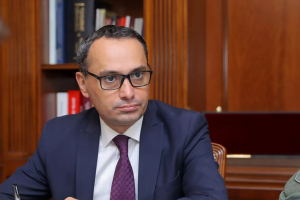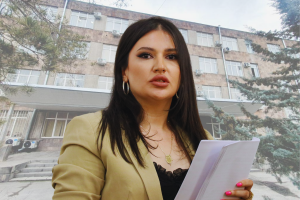A written qualification exam to supplement the anti-corruption specialization sub-section of the Anti-Corruption Division of the List of Candidates to Judges was held on 10 January, the results of which were published on 12 January. Aghavni Madoyan, one of the prosecutors of the General Prosecutor’s Office, received the second highest total score, but her name was not included in the final summary.
In a conversation with Iravaban.net, Madoyan mentioned that she received a total of 60 points, but the problem was that a threshold of 18 points was set for the test task on procedural law, while she received 16 points, with which she did not agree. She wanted to appeal the results in the prescribed manner, but it was not possible.
“The results of the written examination may be appealed to the Appeals Commission within fifteen days after their publication (Article 105.1, Clause 1 of the Judicial Code). Given the high legal force of that law, I did not need to look for another term to appeal in another secondary regulatory legal act. It goes without saying that this term is determined by the legislator and there are no reservations, therefore, a by-law that contradicts it could not be adopted. Meanwhile, it turned out that by the decision of the Supreme Judicial Council, the 15-day period defined by law was reduced to 5 days, and I submitted my appeal on the 6th day.” Aghavni Madoyan mentions and adds that she is convinced that the SJC has committed an action beyond its authority.
She states that state bodies and officials are authorized to perform only those actions for which they are authorized by the Constitution or laws. The powers of the SJC are defined by Article 175 of the Constitution and the Judicial Code.
“It is obvious that the legal norm defining the term of appeal, Article 105.1, point 1 of the Constitutional Law “Judicial Code” did not authorize the SJC to intervene into the period of that term. Therefore, in my estimation, the decision of the SJC in that regard cannot be considered lawful. I would like to add that for me the final result of the competition that is, passing the examination and being appointed a judge of the anti-corruption court, is not absolutely important. The only question I am interested in is that everything is within the law and any deviation from it is unacceptable for me,” the candidate says.
Aghavni Madoyan also mentions that there were problems with examination questions as well. She notes that none of the 30 questions in the Procedural Law Test section of the Civil Cases Sub-Division test were related to the protection of the state’s property and non-property interests, as well as the proceedings related to the confiscation of property under the “Law on Confiscation of Property of Illegal Origin”, which directly contradicts the Judicial Code and the procedure established by the relevant decision of the SJC.
“Instead, questions, which were beyond the jurisdiction of the specialized anti-corruption court, were included. Consequently, the candidate’s knowledge and skills in the field in the competition for a specialized court judge could not be revealed by those questions in any way.” Madoyan says.
She mentions that she presented the problems in detail to the SJC.
In connection with the term, they reasoned that the 3rd sentence of part 5 of article 19 of the law No. HO-331-N of 14.04.2021 “On making Changes and Additions in the Constitutional Law “Judicial Code of the Republic of Armenia” authorized the SJC to set a new term.
In this regard, I consider it necessary to mention that the mentioned legal norm is the final and transitional provision of the law on making changes and additions, which could not endow the SJC with a power it did not have under the Constitutional Law “Judicial Code”. Moreover, the Law on Normative Legal Acts reveals the subject and goals of the regulation of the transitional and final provisions of the legal act, which obviously does not include the possibility of giving the authority to make a decision that contradicts the law defined by the main document, which is not subject to the amendment and addition to the main part of the law on amendment and supplementation. Therefore, in my opinion, the mentioned reasoning is not grounded.” Madoyan says.
She also notes that the SJC does not have the authority to check the compliance of the test tasks until the time of the competition, and can in no way prevent conducting a competition with a test task that contradicts the law. However, the SJC is obliged to check the compliance of the test tasks with the law when summarizing the evaluation results, and the requirement approved by the decision of SJC. “If the Supreme Judicial Council does not control the quality of the test assignments and the legality of the competition, it will turn out that the procedure established by law and the decision of the SJC will be of a formal nature, and their violation will lead to a number of significant problems.”
In response to the question what steps he plans to take, Aghavni Madoyan said,
“Of course, I know what an administrative act adopted in violation of the law is, how it can be challenged. Moreover, I can imagine the possible consequences of contesting an administrative act. And interim, I also imagine what can be done in case the administrative body refuses to adopt the requested favorable administrative act. I have no doubt in my arguments and justifications; I am not skeptical either about the high quality of the administrative court. However, given the importance of establishing a specialized anti-corruption court in the shortest possible time from the point of view of the anti-corruption strategy of the state; Of course, I cannot but subordinate my private interests; and I am not going to take any action in this regard,” she noted.
Yevgenya Hambardzumyan


















